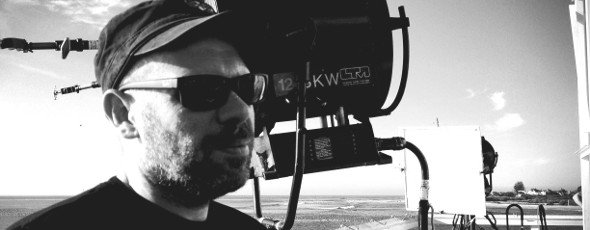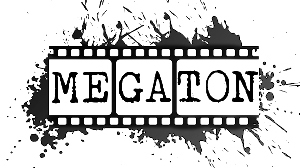
01 Jul Know better the job director with Olivier Megaton (1/2)
After finishing the shooting of Taken 2 and before beginning the editing of his last movie, Olivier Megaton (his real name is Olivier Fontana) has accepted to answer my questions. Simple and unrestrained interview, outside the café far from the social gatherings.
How did you managed to evolve in the cinema industry?
I come from the graffiti world but mainly from the suburbs. I draw since the age of two: it’s a gift and I was always fascinated by that despite the fact I wanted to be a veterinary.
Unfortunately, coming from a humble family, nobody would like me to have a career by drawing because it wasn’t a popular work. Soon, there were some conflicts with my parents and I diverged from what they expected me to do, which in the end allowed me to exist as an artist.
I continued to paint and I ended up to discover the graffiti à the age of 13 (stencil) but also the American graffiti at the age of 15 (paint bomb) during a concert of The Clash. It was a turning point in my life: I was doing fanzines, music… I really grew up in the alternative, the social politic, and the ultra-creativity of the late 70 / early 80.
Having a Cartesian mind, at school I was interested in the scientific channel. So I’ve been nicknamed “The Rubik’s Cube” because I always have one with me since I’m twelve. It helps me to focus because I easily panic when I can’t solve a problem: in the end, it creates a very particular character.
Then, I started to paint with famous artists like Blek, Mesnager, Mystic, Epsilon…Littleby little by meeting people during concert where I could express myself with a paint bomb; I finally met Jean-Baptiste Mondino who offered me a job: I thought about painting. In the end, he announced me he has recently created a production firm and was looking for young people, unfamiliar with the cinema industry but coming from different universe (for example Seb Janiak, director of videoclip for NTM, Janet Jackson, Olivier Dahan director of La Môme…).
Then he asked me to find an idea for a short while trying to convince me to work in the cinema: that’s when I looked at him and asked him if he wasn’t making fun of me.
Because Jean-Baptiste was coming from Aubervilliers (suburb I know pretty much), we shared theses fantastic extreme political stories (like hunting the skinhead), things very cinematographic, unbelievable stories. So, it’s convinced and not knowing how I found the inspiration when I started to write a short with a very thought subject. We lost no time in registering it at the CNC (in 88). Later, I received a call announcing me that I had a subvention. I didn’t get it at the time, but I had the funds to shoot the short. Then, I felt like an idiot because I never went on a set expect on Tchao Pantin or La Balance where I did small jobs (300 francs plus a sandwich for one day of work, it was worth it).
I didn’t want to be a director and that’s how I had to make a short: everybody found this amazing but I was getting nervous because I hadn’t a team.
By talking about it, people get regrouped around the movie, especially the technicians of Luc Besson through a relation, which gave me a good team (I didn’t need any more my assistant, so I fired him right after the first hour of shooting).
I shot this movie like I wanted, everybody found that exciting and that’s how I started to be a movie director: it was my first “Rolling!”, my first “Action!”.
I guess it was a very significant experience?
Yes, very strong. Especially because the story was about one of my friend with whom I used to paint and who get murdered. I shot this short with paranoia for background because it is said that at this time, there was a bunch of guys who were hanging out in the subway and who were settling accounts: it was a very strong memory. The story was so tough that it was PG-16 and censored (the RATP made me cut 2 minutes 30). Because I do things until the end (searching for music, looking for places…), I handled everything myself.
The movie was presented at some festivals and won lots of prizes. I came up against a big problem: I wasn’t from this sphere. I had to face people who were questioning me and whom I wanted to punch – figures because I used to do combat sports since I was little (which helped me to make my personality). So when somebody from Clermont-Ferrand like Claude Duty came to me “Olivier Megaton a compromise between Luc Besson and Tarkovsky, is-it reasonable, necessary, interesting?”, it was getting hard for me to control myself. I guess he’ll remember it all his life because he told me: “I thought you were going to kill me”. Indeed, I was very upset because I wasn’t fond of this sphere. Then I managed to control myself, to listen to them…
I’d just directed a short and in the end I wasn’t very motivated to make another one, a bit disgusted by those people… So, I painted, I traveled around the world… Then Transmusical asked me to do another one, in a workshop because I was doing some with kids from suburbs. I said to myself why not and that’s how I directed my second short: L’égareur. The TV channel Arte heard about it and offered me the possibility to shot my third short: Forte Tête.
Every time I presented my last creation to a festival, I won a price despite the fact it wasn’t my purpose, not even for the competition because I’ve done some on a ring. No, for me the cinema as something else, a memorable experience but I didn’t collect most of the prizes: honestly, people from the short always annoyed me and it was mutual.
After directing three shorts, I started to write a first long. I have the chance to make things works without being able to explain why: people are getting touched, shocked… I never asked to myself questions and I continue like this because I’m addicted to work.
In the end, I’ve made 16 shorts, then I wrote three longs, after that I was proposed to direct La Sirène Rouge. I started to work on it but it was very chaotic at first giving the fact that we alternated preparatory phase and project stop. At this moment, I finally accepted the fact being a genre director in France is to have 1 chance over 10 000 to do things.
I shot another short, Je ne veux pas être sage. For the record, people were saying that it was in fact a long. Everybody considered me as a long director but at this moment, I haven’t shot any yet.
After showing my determination to make one, I met people of Canal+, then TPS who finally accepted to finance me. They gave me four millions of francs (before euro money) and I started to do a long at the very time I was working again on La Sirène Rouge, thinking it will be my first movie: in the end it will be Exit (figures according the cinema sphere).
Do you keep a strong souvenir of it?
Of course and here’s why: four weeks of shooting and no money to shot! In the end, it’s a rich movie, entirely homemade and non-stop, plus that’s when I met significant people like Yvan Lucas…
This movie was the first big step in my career. A new meeting with Luc Besson came after that and he couldn’t resist when he saw the movie: he decided to distribute it in other countries, to sell orders. He was in his favor period because he just quitted Gaumont and RB2K was just created, he really wanted to work with other directors.
After lots bad luck like for Gaspard Noe, Yann Kounen, all my generation, having difficulties to make our movies, then everything seemed to be unlocked: I made Exit followed by La Sirène Rouge the next year. That’s how everything started, but it didn’t keep me from painting. The cinema is a disease still haunting me; I simply accepted it and became a film maker.
Do you think your graffiti experience influenced your directions?
I think it has an influence over my mind, my work because when you paint graffiti, you’d better have a solid method, a strong mind, a will and pugnacity above everything. When you’re facing a 100m long and 10m high wall, you feel very small and keep thinking that you’d better be motivated.
Very quickly you project rushes in your mind in order to better visualize how it will be perceived: it’s my mentality, although all the graffitists may have it too.
It was for the form. Now for the content, my social origin made my parents not encouraging me in this domain because they had a gifted son. They only discovered 10 years ago that I had a real job. It’s very particular, I had to fight and the graffiti allowed me to exist by myself, to meet people, to access the cinema, to structure, to learn the chromatics, the colors…
Outwards the discipline I imposed to myself, it allowed me to focus, to calm down…
I still see people I’ve known since I’m 13-14; they had the serenity that everybody doesn’t have because they could do what they wanted in their life. I’m very proud to see people like Shuck2 who still call me in order to organize a Graph Park at Nanterre: not only he persists but he wants to share.
I’m one of the people who painted the most in the country and it allowed me to meet a lot of people. Regarding the number of kids to whom I teached to paint, it’s monumental: if you calculate, I’ve been in 240 town in France and 10-15 town in foreign countries, it’s huge.
It’s my victory over life: I’ve been help by people, disowned by others but in the end I got out of this situation.
At the time, the graffiti was said to be “bourgeois” even if I knew people coming from the same social-class like mine. Regarding that, I said to myself that I couldn’t fight, not having the same codes, the same language… I just worked without looking for any recognition: in the end, I went beyond those people. While they were painting in the streets, I was having troubles with the justice. My life wasn’t the same and most of all I didn’t have the same confidence as them. When I was getting arrested, the risk was higher for me. Yet, I had the opportunity to be put aside from the wrong path by my friends, who made me understand that I had something unique in my hands.
Regarding all I went through but also regarding my suburb origin, I can’t even for a second, thinking where I stand now, disappointing myself but also those who stands aside me, that’s what preserved me and made me survive.
